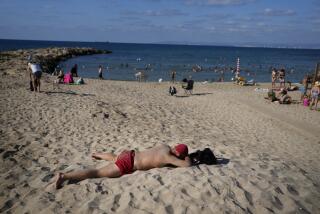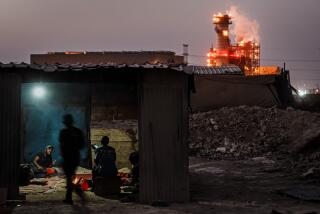To Israelis, Nowhere Is Safe After Attacks in ‘Nice, Quiet Place’
- Share via
JERUSALEM — JERUSALEM -- Under fire at home, uncomfortable in Europe, Israelis seek escape from their disastrous domestic circumstance by traveling to exotic locations. The white beaches and dramatic safaris of Kenya have proved especially attractive, a getaway from news, violence and pressure in a small country surrounded by hostile neighbors.
The escape was shattered Thursday, and Israelis today feel doubly vulnerable. Their worst fear, that Israelis are subject to attack everywhere -- that, in fact, nowhere is safe -- has in their minds been confirmed.
Several hundred Israelis were targeted Thursday, including scores of guests waiting in the lobby or walking to their rooms at the Paradise hotel on Kenya’s Indian Ocean coast, and 271 passengers and crew members aboard an Israeli charter jet that narrowly missed being hit by two surface-to-air missiles as it departed the nearby Mombasa airport.
The synchronized attacks killed at least 15 people, injured dozens and painted for Israelis a world a little bit smaller and a lot more dangerous.
“Israelis have always kept an eye open in the back of their heads,” said Stuart Schoffman, an Israeli writer and commentator who travels extensively in Europe and the United States. “Now I would think people are going to keep that eye more open and more alert than before. You would think that a place like [Mombasa] is exotic and obscure, but in today’s world, there’s nothing that’s obscure.”
The events in Kenya also had an effect on Israeli politics, frightening people on the very day that about 300,000 were eligible to vote in a primary for the right-wing Likud Party that will essentially determine the next prime minister of Israel.
Foreign Minister Benjamin Netanyahu, who conceded the race to Prime Minister Ariel Sharon in Thursday’s vote, called a morning news conference within hours of the attacks to say they validated his opposition to the establishment of a Palestinian state.
“Yesterday, I warned that our planes would be attacked with missiles should the Palestinians be granted a state,” he said. “Today we suffer missiles in Mombasa; tomorrow it will be Ben Gurion,” Israel’s main airport.
There wasn’t much that he or other officials could say that comforted potential voyagers. Travel agents often caution Israeli tourists to refrain from speaking Hebrew loudly, or suggest that religious men wear baseball caps instead of yarmulkes.
But as Netanyahu put it, “We can’t put an armed guard by every Israeli tourist.”
Israelis are inveterate travelers. Young adults frequently go backpacking in Nepal or India for months on end, usually in the year before or after mandatory army service. Families often spend Passover or summer holidays abroad.
After the Palestinian intifada, or uprising, began 26 months ago, Israelis drastically curtailed visits to neighboring Egypt and Jordan. In recent months, many Israelis said they felt uncomfortable in Europe: They regarded anti-Israel sentiment generated by the Palestinian conflict as a festering form of anti-Semitism.
And so, far-flung destinations have become more and more popular, and travel agents say Kenya held special allure, offering warm seas and wild animals for relatively inexpensive prices.
At the Paradise hotel, thousands of Israelis arrived every year for $750-a-week package deals. About 100,000 Israelis have flocked to Kenya’s beaches in the last six years, according to the Paradise Mombasa Co. travel agency, which specializes in such tours.
Like clockwork, a weekly charter flight deposits about 300 Israelis every Thursday morning and retrieves about the same number for transport home. From the Mombasa airport they are driven over unpaved roads lined with robust baobabs and swaying coconut palms to the secluded, gated Paradise hotel. Signs at the hotel are in Hebrew and English. On this Thursday, a large menorah was on display.
The Israeli families who flew to Kenya on Thursday would have been spending the Hanukkah holiday there. Instead, some were in hospitals and others were awaiting evacuation.
“Now everyone is thinking of going home,” said David Kapah, a banker from Tel Aviv who escaped his flaming room with his 12-year-old son. “Our friends who came here before told us it was such a nice, quiet place with a nice beach and friendly people. Look what happened.”
“New York is not safe, Karachi is not safe, Tel Aviv is not safe, and now this tiny village is not safe from terrorism,” said Israeli businessman Sulami Yehuda, who operates the hotel. “We don’t need any more proof that nowhere is safe from terrorists.”
Surely the luckiest people of the day were the passengers aboard Arkia Flight 582. Minutes after it took off from the Mombasa airport, as Capt. Rafi Marek pulled up the landing gear, two missiles whizzed by the left side of the aircraft. Marek felt a bump and thought it was probably a bird -- except for the two streaks of white smoke that trailed through the morning sky.
Many of the passengers did not realize how close to death they had come, until they saw Israeli F-16 fighter jets outside their windows once the flight entered Israeli airspace.
When the Boeing 757 touched down, the pilot had these simple words: “We are home.”
The passengers applauded and burst into song. “Hevenu shalom alechem.” “We have brought peace unto you.”
*
Wilkinson reported from Jerusalem and Maharaj from Kenya.
More to Read
Sign up for Essential California
The most important California stories and recommendations in your inbox every morning.
You may occasionally receive promotional content from the Los Angeles Times.














